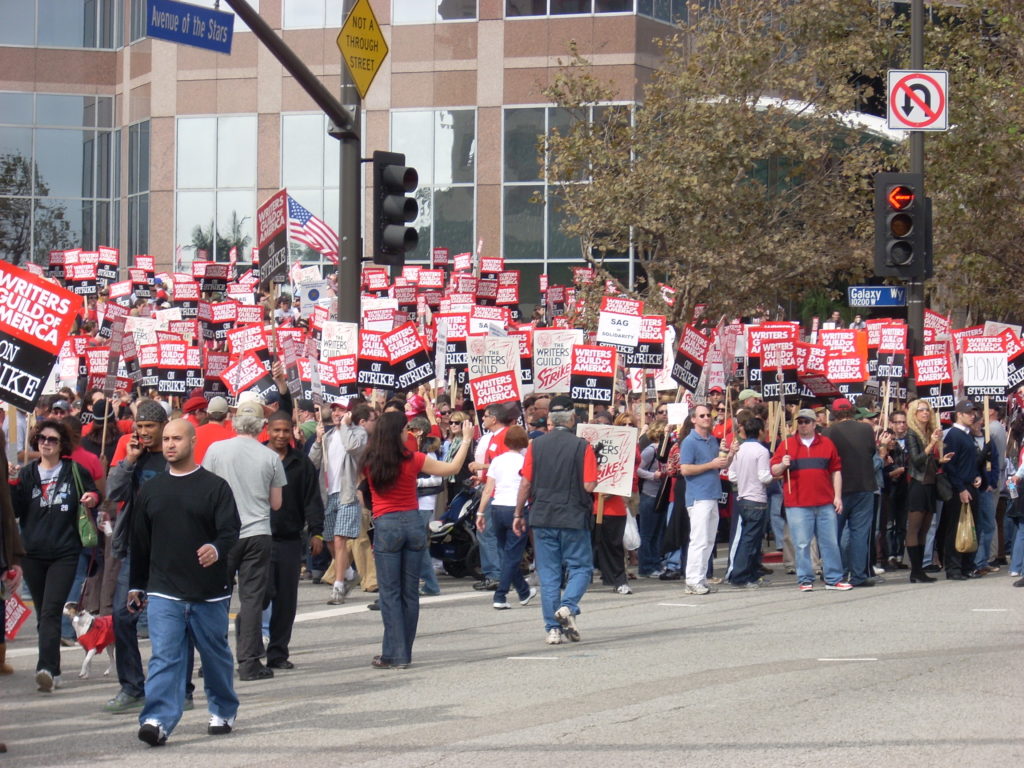
On November 5th, 2007, the Writers Guild of America, East, and Writers Guild of America, West, went on strike. These television, film and radio writers had been in negotiations with Alliance of Motion Picture and Television Producers, which represented 397 film and television producers, including some of the biggest names in entertainment: CBS, NBC Universal, Walt Disney Company, Paramount Pictures, News Corp., Sony Pictures Entertainment, MGM and Warner Brother.
The writers wanted a greater share of the royalties from the “new media” of the time: compensation for delivery channels such as Internet downloads, IPTV, streaming, smart phone programming, straight-to-Internet content, and other “on-demand” online distribution methods, along with video on demand on cable and satellite television. When negotiations failed, the writers launched a strike that affected both Los Angeles and New York productions, lasted nearly one hundred days and cost between $1-3 billion in revenue in LA County alone.
Twelve thousand writers went on strike. Production ceased on 60 TV shows. Late-night talk shows immediately went into reruns. Striking writers picketed targeted studios in Los Angeles and numerous sites in New York and maintained the picket lines for the duration of the one hundred days. They used a variety of tactics, including “Bring-A-Star-To-Picket-With-You” (also called “Cast Day”) and “Bring-Your-Kids” special events. They encouraged fans to mail boxes of pencils to the producers along with a note of support for the strike. They used online blogs and videos to educate the public.
To help people do the math on the writers’ demands, WGAW president Patric Verrone stated, “If they gave us everything we had on the table right now, if they gave us everything we wanted—everything—and they then made a deal with the DGA and matched it, which is what they’ll do, and then they made a deal with the Screen Actors Guild and tripled it, which is typically what happens…if they did that—if they gave us everything—on a company-by-company basis they would be giving all of us less than each of their CEOs makes in a year. And in some cases, a lot less.”
After a well-publicized and popularly supported strike, the guilds resumed negotiations with the Alliance of Motion Picture and Television Producers in February, and the writers voted to end the strike on February 12th, 2008. They ratified the new contracts on February 26th. Wikipedia reports that, “At the resolution of the strike, the writers achieved a qualified success: while they lost out on short-term deals, they received a new percentage payment on the distributor’s gross for digital distribution and emerged united.”
Learn more here:
https://en.wikipedia.org/wiki/2007%E2%80%9308_Writers_Guild_of_America_strike
Photo Credit: Striking WGA members in Century City, Los Angeles, California on Nov. 7, 2007, by en:User:Jengod – Own work, GFDL, https://commons.wikimedia.org/w/index.php?curid=3076647
This article is from Rivera Sun’s book of nonviolent histories that have made our world. Click here for more information.
______________________________________

Rivera Sun is a change-maker, a cultural creative, a protest novelist, and an advocate for nonviolence and social justice. She’s a love-based revolutionary and the author of The Dandelion Insurrection, The Way Between and ten other fiction, non-fiction and poetry books. Her essays and writings are syndicated by Peace Voice, and have appeared in over a hundred journals nationwide. Rivera Sun speaks and facilitates workshops in strategy for nonviolent change across the country and around the world. She connects the dots between the issues, shares solutionary ideas, and inspires people to step up to the challenge of being a part of the story of change in our times. www.riverasun.com